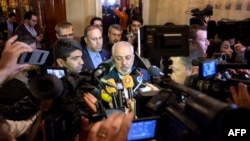The French and German foreign ministers joined the talks in Switzerland on Iran’s nuclear program Saturday, as negotiators, including the U.S. secretary of state and Iran’s foreign minister, worked toward a midnight Tuesday deadline.
The ministers held private sessions with Iranian Foreign Minister Mohammed Javad Zarif and consulted with U.S. Secretary of State John Kerry.
France, Germany and the United States are three of the six countries designated by the U.N. Security Council to conduct the talks. The British, Russian and Chinese foreign ministers are expected to join the final push to the deadline in the coming days.
Officials described the talks as “tough” and “difficult.” They said agreement was possible but not guaranteed. Several issues appeared to still be in dispute, including the timetable for easing economic sanctions that have crippled Iran's economy.
Iran's Zarif said in a Twitter message Saturday that his country was ready to make a good deal and was waiting for its counterparts to do the same.
A senior U.S. State Department official said Saturday, "The serious but difficult work continues. We expect the pace to intensify as we assess if an understanding is possible."
Key goals
The key goals of the talks, which started two years ago, are to verifiably limit Iran’s nuclear program to ensure it cannot quickly build a nuclear weapon, and to end economic sanctions against it.
The issues are highly complex and technical, making both sides concerned about leaving the other a way out.
The sanctions are a web of measures imposed by the United Nations, the European Union, the United States and several other countries, and they have a variety of conditions and mechanisms attached to them.
Iran wants all the sanctions lifted as quickly as possible after an agreement is reached. The U.N. negotiators insist on a gradual lifting as Iran demonstrates it is complying with its commitments.
Analyst Trita Parsi of the National Iranian American Council said Iran will insist on at least some sanctions relief immediately.
"The Iranians, it appears like, want to make sure that the Western side agrees to one permanent measure up front, in order to signal its seriousness about seeing through this deal, not for now but for the next 10 years," Parsi said.
That could be some of the United Nations sanctions, which Kelsey Davenport of the Arms Control Association in Washington, said are particularly objectionable for Iran.
"Iran views these sanctions as illegal, and wants them lifted early in an agreement. For Iran, the U.N. Security Council sanctions carry a significant stigma. And that’s why symbolically lifting them is something that Iran has prioritized," Davenport said.
U.N. sanctions
The U.N. sanctions cover weapons, nuclear technology and items with military applications, and impose travel bans and asset freezes on some Iranian officials. The most recent U.N. sanctions, now five years old, include some financial and trade restrictions, but Davenport said they have not been the ones that have particularly hurt the Iranian economy.
“Sanctions from the United States and the EU that target the banking sector, the oil sector, investment in Iran, those are the measures that have really damaged Iran’s economy. And suspending the lifting those sanctions are what will allow Iran’s economy to rebuild," Davenport said.
But lifting those sanctions requires action by Western political leaders, including U.S. President Barack Obama, who faces strong opposition in Congress to any move to ease pressure on Iran. The president has the authority to lift or suspend many of the U.S. sanctions on his own, but he will eventually need congressional approval to end them.
That is likely years away, and officials hope opposition will ease if Iran is complying with an agreement.
In any case, none of this is expected to start until later this year. As difficult as these talks have been, they are only aimed at agreeing on what Secretary Kerry calls “the major elements,” with three more months of talks planned to work out the details.













